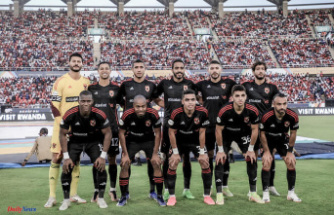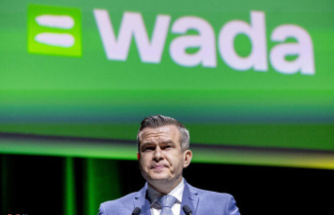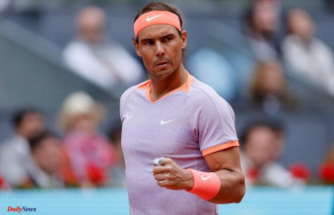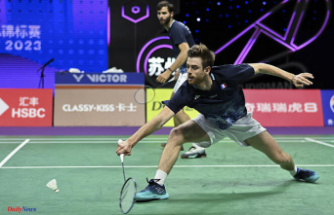The Ultimate Fighting Championship (UFC) is the Mecca of the martial arts scene. Mixed martial arts fighters around the world are looking to get in the cage for the US promoter. Peter Sobotta has already traveled this path and is now training the next generation of fighters to make the leap. In an interview with ntv.de, the 35-year-old explains what it takes to get into the UFC and what challenges the German MMA scene is facing.
ntv.de: Anyone who speaks of mixed martial arts usually thinks of the largest organization in this sport - the UFC. There are only a few athletes from Germany who are currently fighting there, but you have completed several fights in the UFC. What does it take to get into the elite league?
Peter Sobotta: I know the criteria that the UFC looks at. I once sat down with Sean Shelby, who is responsible for match scheduling and commitments at the UFC, and he explained to me what the most important things are. The first is: the fighter must be active. The UFC can't do anything with you if you only fight every two years. You want to continuously present people and tell a story.
The second is: you have to be a finisher. Or you have to recognize in the fighting style that you are looking for the premature end of the fight. No organization that puts on a lot of show wants to see fighters trying to win on points. The more knockouts and submissions, the better.
The third, of course, is the fight record. You don't have to have fought absolute killers without exception, but if you're not fighting breakers, you have to show that they don't belong in the ring with you. If the UFC realizes that they already have problems with weaker opponents, it won't work. You should also have fought a real name - a former UFC fighter or someone Sean Shelby knows.
Then the sporty moves into the background in favor of show at the UFC. But a fighter can't go all out ruthlessly every time?
It doesn't always work. Better a tactical victory than a defeated battle. But the show business factor has become more important in recent years. You also do the sport to make money.
Earning money is not exactly easy for MMA professionals in Germany. You look after a whole range of athletes. How do you see the sport developing here?
Progress is slow, but in the right direction. So more and more people are being flushed into the sport and there is more and more talent. What is happening here on a small scale in Balingen is happening on a large scale across the country: More and more people are taking part in the sport and the quality is increasing as a result. It is only a matter of time before we also produce champions in Germany.
Many of the fighters in Balingen model themselves on their path to the UFC. Is there a patent recipe?
There is no prescribed path because there is no federation structure in MMA. You can't level up like in a league system. You fight your way up, but in a way you have to be in the right place at the right time. The right people need to see it for you to get your chances. Contacts and vitamin B make that easier. If you were to bring a pattern in there, it would look like this: First, the focus is on training and building up the skills that you need in MMA. That's years of work. Then the amateur fights begin, where the fight record doesn't matter. It's about gaining experience. It's also not a problem if someone fights stronger opponents and loses. It's already clear who's tough enough and who's up for going this route. Those who successfully pass the amateur phase switch to the professionals. And it's more about building a good fight record.
As said before, you need a good winning streak to qualify for the big organizations. That's why we continuously build people up. You won't be over-challenged, but you won't be under-challenged either when it comes to the matches. They should grow step by step until they have the appropriate know-how. We then have the contacts to also place them internationally.
There are more and more events, but TV stations and media groups don't really dare to approach the sport in terms of marketing.
That's true, but good things are happening in the German scene. NFC and Fighting.de are a good platform for German fighters. The Czech organizer Oktagon has also come to Germany and there is also the Super League in Berlin. There are some ambitious companies, but the big breakthrough has not yet happened.
Why is that?
Due to the fact that MMA does not yet have a great standing, nobody is ready to really invest. The fights can only be shown on TV from 11 p.m. - this is regulated by law. It's different in streaming, but if it got more attention on free TV, the mainstream would be more involved. Then more would work.
Then at some point fighters in Germany only have the option of going abroad?
If someone really wants to make something of themselves in this sport, they use the German scene to gain experience. You use them as a stepping stone to fight internationally. There's no other way. We have two champions from Balingen in the largest organization and they are far from making a living from it. If you're the best at national level, you'll get some followers and applause - that's it. You have to fight in the UFC, One Championship or Bellator to make a living from it. At least that's the case now.
Boxing is currently benefiting from Youtubers getting in the ring and competing against each other. Would something like that also be conceivable in MMA?
In Poland they have already successfully implemented something of the kind. Ten years ago, sport was about as advanced there as it is now in Germany. Then Mariusz Pudzianowski came to the MMA organization KSW. Pudzianowski was one of the world's best strongmen for a long time, pulled tractors, the whole program. In Poland he is a folk hero. He has brought many mainstream viewers to MMA and many have come to love the sport. If you build up something like that in Germany, with one or two celebrity fights in an otherwise sporting event, then that's a good compromise. Sending any youtuber in the ring does generate a lot of ticket sales, but is that good publicity for the sport? I wouldn't wish it to go that way.
Michael Bauer spoke to Peter Sobotta












